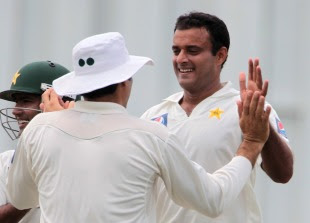Gambhir, Yusuf, Uthappa hit jackpot
Shaking off months of controversy, litigation and uncertainty, cricket's biggest, richest and most brassy domestic event, the Indian Premier League, sprang into life again, breaking records and banks on the first day of auction weekend in Bangalore.
From the 88 players auctioned today, 15 new millionaires were created by the ten IPL franchises who will compete in season four, but there was another sorry bunch of 16 players who were left 'unsold' when the auction finally ended at 6 pm.
Minutes after his name was the first to be randomly pulled out from a list of 'marquee players' at 11 am on Saturday morning, Gautam Gambhir earned the highest playing contract in cricket, $2.4m for two years with the Kolkata Knight Riders. With the top seven of the 15 new 'millionaires' being Indian, the day was marked by big spends for the small 48-strong pool of home-grown talent available to the ten teams, who must now compete to create new squads from scratch. Just over a month ago, the number of teams in the auction had been unclear, with Kochi trying to establish an undisputed ownership pattern and Rajasthan Royals and Kings XI Punjab fighting the BCCI against their sudden expulsion from the lucrative league.
In Bangalore on Saturday though, with differences quelled for the moment, the auction diverted the IPL spotlight away from legal disputes towards the Bollywood and business-driven spectacle it was meant to be. There were 72 players (30 Indians, 42 foreign players) sold on the first day of the auction for $52.8m. If Gambhir was the highest-earning Indian ever in the league (going for more than Sachin Tendulkar, M S Dhoni and Virender Sehwag's 'retention' salaries), Sri Lankan Mahela Jayawardene became the highest-earning overseas player, signed on for $1.5m by Kochi, the only team left to declare its formal, merchandise-friendly IPL name. They have until April 8 to decide, the IPL beginning just a week after the end of the World Cup.
If there was a single trend through the giant auction player pool, it was this: younger, high-impact men, whether with bat or ball, and genuine multi-tasking all-rounders went for the highest price, even if it was the sole big spend a team could make. The player's marketability was an additional bonus. It is what explains the $1.9m for Irfan Pathan, who has spent a good portion of the domestic season injured and now finds himself out of India's World Cup probables as well.
The short supply of Indians in categories of all kind meant that a younger bunch of Indians suddenly found themselves receiving wages far higher than their more experienced colleagues. The Pune Warriors' $2.1m spend on Robin Uthappa (only the third $2m man), for example, was well ahead of their $1.8m on Yuvraj Singh, who may well eventually be named Pune captain.
South African Twenty20 captain Johan Botha went for almost double the price of his Test and ODI captain Graeme Smith to Rajasthan Royals, the team Smith had played for in the first three years. Along with the franchise owners and coaches present in the auction room, the team's captain-coach Shane Warne spent the day in consultations over the telephone with the franchise.
There were several approaches at work today: Kolkata made their intentions clear early on, first winning all-rounder Yusuf Pathan at the second-highest bid for the day, $2.1m. By lunchtime, they had spent another $1.1m on South African all-rounder Jacques Kallis. As the only team to have three millionaires on their payroll, Kolkata were willing to gamble early on spending more than half of the $9m salary cap on three players.




